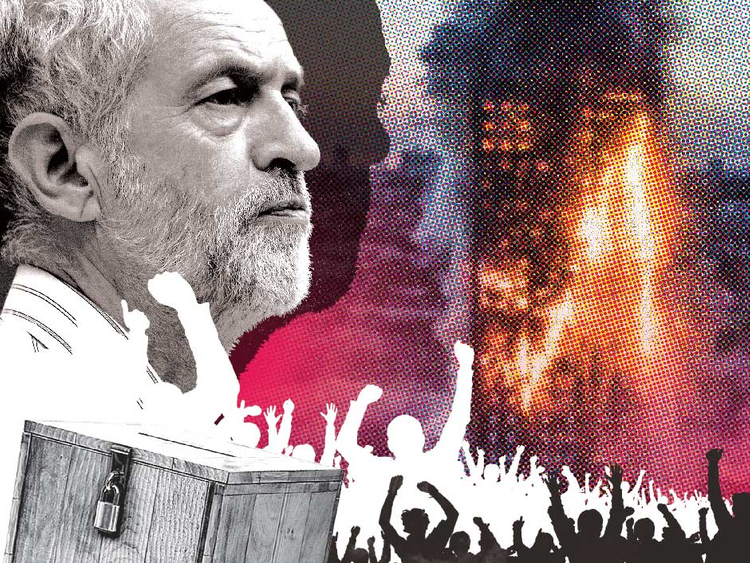Gulf News
In case you didn’t notice, Britain just held an election and the ruling Conservative Party, which had expected to win by a landslide, got hammered. The experts had given Jeremy Corbyn, the leader of the opposition Labour party, almost no chance. To be sure, he campaigned on a platform of stringent opposition to long years of Conservative-ordained austerity — a message that resonated especially with students and the discontented. Yet, who would vote for a not-entirely-reformed Marxist, a man who has publicly flirted with the Irish Republican Army and former Venezuelan president Hugo Chavez? As it turned out, there were plenty of voters who preferred “Loony” Labour to the incumbents — enough of them to strip Prime Minister Theresa May of her majority. Once again, the pundits were confounded.
The horrific fire in Grenfell Tower in western London might help to explain why things turned out this way. The 24-storey building was an island of public housing in a surrounding sea of high-end real estate — the sort of ultra-fabulous homes that have proliferated in the city in recent years as soaring prices have driven out middle-class families.
The residents of Grenfell had long warned about poor safety in their building — but no one was listening. Their ominous predictions came true on the morning of the fire. The central fire alarm system failed. Sprinkler systems malfunctioned. So far 17 have died, but the final toll is likely to be much higher. There were probably around 600 people in the building when the fire broke out. In scenes reminiscent of the World Trade Centre towers on 9/11, some chose to jump from the upper floors rather than being burned alive.
Yet, the culprits this time weren’t terrorists. Many Londoners immediately blamed systematic neglect by the powers that be. Danny Vance, a local pastor, didn’t pull his punches: “The disparity in this country between rich and poor is disgusting,” he told an interviewer from a London paper. “This would not have happened in those 2m [$2.5 million or Dh9.19 million], 5m flats around the corner.”
Some of the theories about the fire may prove to be overblown. Some locals claimed that the fire was fuelled in part by the cladding that had recently been added to the outside of the structure to make it look like less of an eyesore to the surrounding upmarket neighbourhoods. But that such ideas are even being aired tells you a lot about the problems festering in British society.
You don’t have to take my word for it. In an article in Wednesday’s edition of Financial Times — a publication not usually suspected of sympathy for the Loony Left — columnist Edward Luce argues that the Anglo-American world has become the victim of its own arrogance. He recalls how both Britain and the United States embraced thoroughgoing free market reforms during the “Reagan-Thatcher revolution of the 1980s”. They had good reasons for doing so, he contends, but they overdid it: “Hundreds of thousands of French lawyers and financiers may have moved to London in the last generation. Many more British have been priced out of their own capital city.”
As Luce goes on to note: “How do you put a value on democracy? For all its stagnation, France has done a better job at keeping its left-behinds above water than its Anglo-Saxon rivals. There are more prime-aged French males in jobs than in the US, an unimaginable statistic even 10 years ago. France’s level of income inequality is lower than that of either the US and the UK, both of which are near the top of the Gini coefficient league [a leading measure of income inequality]. Among the OECD club of developed economies, only Chile and Mexico score worse than the US. What applies to France is truer of Germany, which looks set to re-elect a moderate government in September.”
Just for good measure, Luce points out that the British and Americans have a long record of boasting about their economic adaptability that sits poorly with these grim realities. Small wonder that many younger people in both countries increasingly feel that capitalism doesn’t live up to its storied reputation.
To be sure, the problems faced by the liberal democracies go beyond mere economics. There’s also a pervasive sense of division and distrust, a swelling paranoia of disenfranchisement. US President Donald Trump’s voters, whom he calls “the Forgotten People”, seem to be motivated as much by cultural anxiety as anything else. Those who voted for Brexit felt compelled to take back control over their own lives — “sovereignty” — from a distant and threatening Brussels.
Yet, the economic factor can’t be ignored — especially when disasters like Wednesday’s fire in London show that ingrained inequality can be a matter of life or death. Are the West’s leaders listening?
— Washington Post
Christian Caryl is a senior editor with Washington Post.












